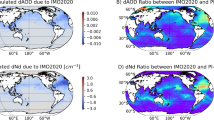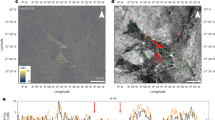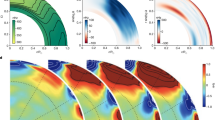Abstract
IT has been shown1 that the first-order effect of the oblateness of the Earth can be simply incorporated in the standard analysis of the effect of air drag on a satellite orbit. However, King-Hele and Leslie2 ignore this correction in a comparison of theory and observation on the orbit of Sputnik 2 (1957β) in favour of terms of higher order in the eccentricity.
This is a preview of subscription content, access via your institution
Access options
Subscribe to this journal
Receive 51 print issues and online access
$199.00 per year
only $3.90 per issue
Buy this article
- Purchase on Springer Link
- Instant access to full article PDF
Prices may be subject to local taxes which are calculated during checkout
Similar content being viewed by others
References
Parkyn, D. G., Nature, 181, 1156 (1958).
King-Hele, D. G., and Leslie, D. C. M., Nature, 181, 1761 (1958).
Author information
Authors and Affiliations
Rights and permissions
About this article
Cite this article
PARKYN, D. Effect of Air Drag on the Orbit of an Earth Satellite. Nature 182, 787–788 (1958). https://doi.org/10.1038/182787b0
Issue Date:
DOI: https://doi.org/10.1038/182787b0
Comments
By submitting a comment you agree to abide by our Terms and Community Guidelines. If you find something abusive or that does not comply with our terms or guidelines please flag it as inappropriate.



